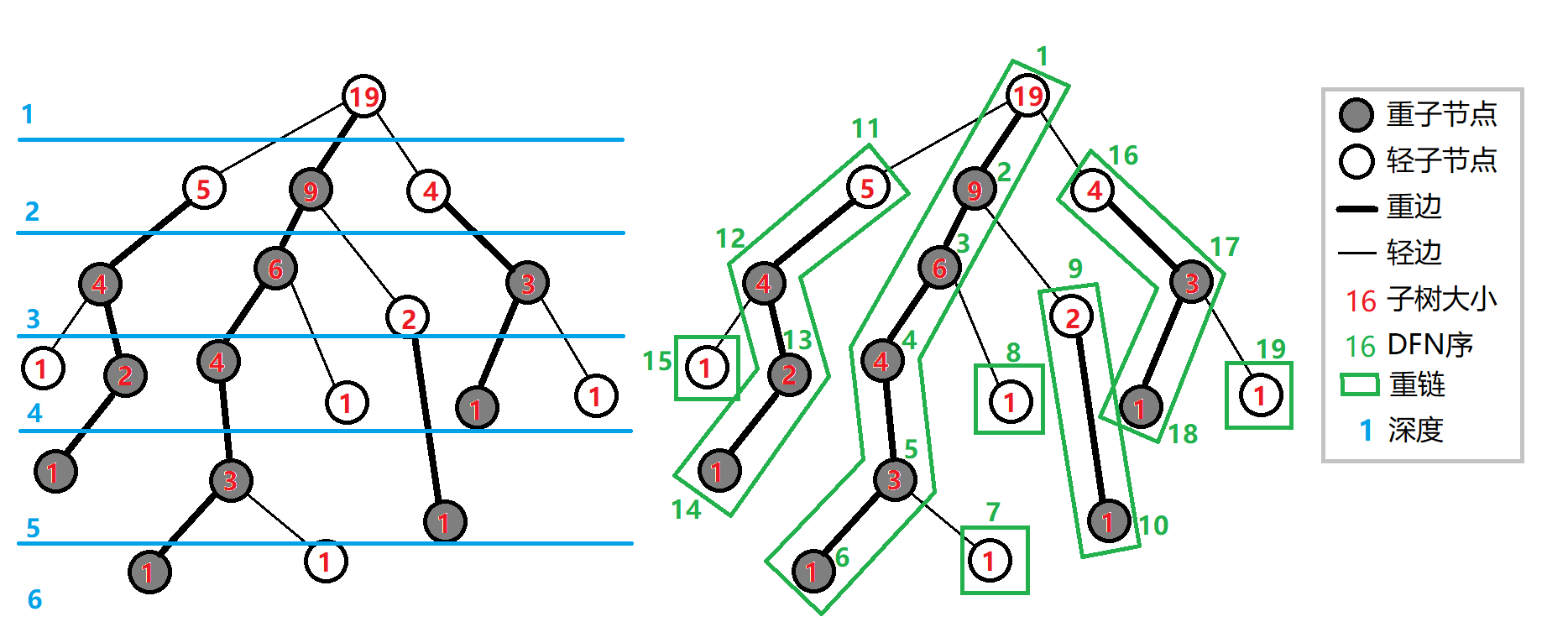1
2
3
4
5
6
7
8
9
10
11
12
13
14
15
16
17
18
19
20
21
22
23
24
25
26
27
28
29
30
31
32
33
34
35
36
37
38
39
40
41
42
43
44
45
46
47
48
49
50
51
52
53
54
55
56
57
58
59
60
61
62
63
64
65
66
67
68
69
70
71
72
73
74
75
76
77
78
79
80
81
82
83
84
85
86
87
88
89
90
91
92
93
94
95
96
97
98
99
100
101
102
103
104
105
106
107
108
109
110
111
112
113
114
115
116
117
118
119
120
121
122
123
124
125
126
127
128
129
130
131
132
133
134
135
136
137
138
139
140
141
142
143
144
145
146
147
148
149
150
151
152
153
154
155
156
157
158
159
160
161
162
163
164
165
166
167
168
169
170
171
172
173
174
175
176
177
178
179
180
181
182
183
184
185
186
187
188
189
| #include <bits/stdc++.h>
#define int long long
using namespace std;
const int _ = 1e5 + 7;
int N, M, P, R, val[_];
int fa[_], Hson[_], Dep[_], Size[_], Top[_], seg[_], rev[_], DFNtot = 0;
int head[_], Tot = 0;
struct Node {
int y, next;
Node() {next = 0;}
} node[2 * _];
void add(int x, int y) {
++Tot;
node[Tot].y = y;
node[Tot].next = head[x];
head[x] = Tot;
}
void Podfs1(int p, int f) {
fa[p] = f;
Dep[p] = Dep[f] + 1;
Size[p] = 1;
for (int i = head[p]; i; i = node[i].next) {
int v = node[i].y;
if (v == f) continue;
Podfs1(v, p);
Size[p] += Size[v];
if (Size[v] > Size[Hson[p]]) Hson[p] = v;
}
}
void Podfs2(int p, int top) {
++DFNtot;
Top[p] = top;
seg[p] = DFNtot;
rev[DFNtot] = p;
if (Hson[p])
Podfs2(Hson[p], top);
for (int i = head[p]; i; i = node[i].next) {
int v = node[i].y;
if (v == fa[p]) continue;
if (Hson[p] != v) Podfs2(v, v);
}
}
struct Tree {
int l, r, sum;
int lazy;
} tree[4 * _];
int lson(int root) {return root << 1;}
int rson(int root) {return root << 1 | 1;}
void Push_Up(int root) {
tree[root].sum = (tree[lson(root)].sum + tree[rson(root)].sum) % P;
}
void Push_Down(int root) {
if (tree[root].lazy != 0) {
int num = tree[root].lazy;
tree[lson(root)].sum = (tree[lson(root)].sum + (tree[lson(root)].r - tree[lson(root)].l + 1) * num % P) % P;
tree[rson(root)].sum = (tree[rson(root)].sum + (tree[rson(root)].r - tree[rson(root)].l + 1) * num % P) % P;
tree[lson(root)].lazy = (tree[lson(root)].lazy + num) % P;
tree[rson(root)].lazy = (tree[rson(root)].lazy + num) % P;
tree[root].lazy = 0;
}
}
void Build(int l, int r, int root) {
tree[root].l = l;
tree[root].r = r;
if (l == r) {
tree[root].sum = val[rev[l]] % P;
return ;
}
int mid = l + r >> 1;
Build(l, mid, lson(root));
Build(mid + 1, r, rson(root));
Push_Up(root);
}
void Change(int root, int l, int r, int L, int R, int num) {
if (L <= l && r <= R) {
tree[root].sum += (r - l + 1) * num % P;
tree[root].sum %= P;
tree[root].lazy += num % P;
tree[root].lazy %= P;
return ;
}
Push_Down(root);
int mid = l + r >> 1;
if (L <= mid)
Change(lson(root), l, mid, L, R, num);
if (mid < R)
Change(rson(root), mid + 1, r, L, R, num);
Push_Up(root);
return ;
}
int Query(int root, int l, int r, int L, int R) {
if (L > r || R < l) return 0;
if (L <= l && r <= R)
return tree[root].sum % P;
int ans = 0;
Push_Down(root);
int mid = l + r >> 1;
if (L <= mid) {
ans += Query(lson(root), l, mid, L, R) % P;
ans %= P;
}
if (mid < R) {
ans += Query(rson(root), mid + 1, r, L, R) % P;
ans %= P;
}
return ans % P;
}
void TChange(int u, int v, int num) {
while (Top[u] != Top[v]) {
if (Dep[Top[u]] > Dep[Top[v]]) {
Change(1, 1, DFNtot, seg[Top[u]], seg[u], num);
u = fa[Top[u]];
} else {
Change(1, 1, DFNtot, seg[Top[v]], seg[v], num);
v = fa[Top[v]];
}
}
if (Dep[u] > Dep[v]) swap(u, v);
Change(1, 1, DFNtot, seg[u], seg[v], num);
}
int TQuery(int u, int v) {
int ans = 0;
while (Top[u] != Top[v]) {
if (Dep[Top[u]] > Dep[Top[v]]) {
ans = ans + Query(1, 1, DFNtot, seg[Top[u]], seg[u]) % P;
ans %= P;
u = fa[Top[u]];
} else {
ans = ans + Query(1, 1, DFNtot, seg[Top[v]], seg[v]) % P;
ans %= P;
v = fa[Top[v]];
}
}
if (Dep[u] > Dep[v]) swap(u, v);
ans = (ans + Query(1, 1, DFNtot, seg[u], seg[v]) % P) % P;
return ans;
}
signed main() {
cin >> N >> M >> R >> P;
for (int i = 1; i <= N; i++) cin >> val[i];
for (int i = 1; i < N; i++) {
int x, y;
cin >> x >> y;
add(x, y);
add(y, x);
}
Podfs1(R, 0);
Podfs2(R, R);
Build(1, DFNtot, 1);
while (M--) {
int k;
cin >> k;
if (k == 1) {
int x, y, z;
cin >> x >> y >> z;
TChange(x, y, z);
} else if (k == 2) {
int x, y;
cin >> x >> y;
cout << TQuery(x, y) << '\n';
} else if (k == 3) {
int x, z;
cin >> x >> z;
Change(1, 1, DFNtot, seg[x], seg[x] + Size[x] - 1, z);
} else if (k == 4) {
int x;
cin >> x;
cout << Query(1, 1, DFNtot, seg[x], seg[x] + Size[x] - 1) << '\n';
}
}
return 0;
}
|
